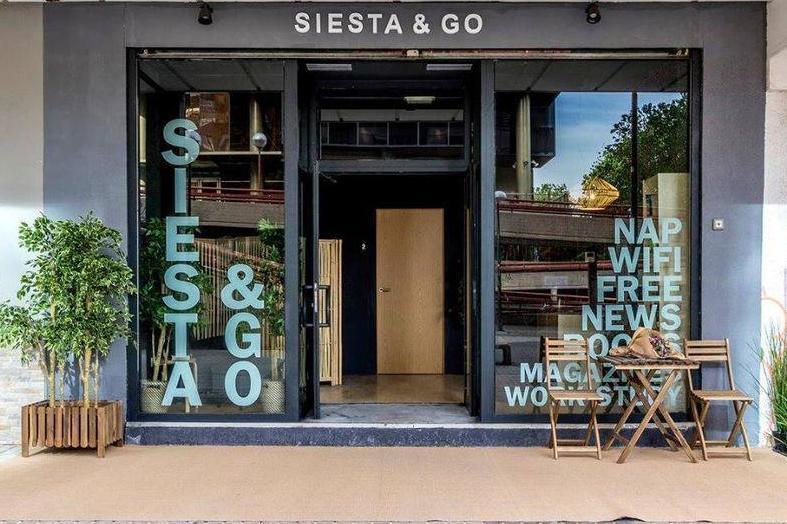Siesta and Go: The Spanish startup revitalising nap culture and helping tired workers
Bankers, lawyers and consultants catch up on their sleep at Siesta and Go - Madrid's first nap-bar located in the heart of the city’s financial district

Your support helps us to tell the story
From reproductive rights to climate change to Big Tech, The Independent is on the ground when the story is developing. Whether it's investigating the financials of Elon Musk's pro-Trump PAC or producing our latest documentary, 'The A Word', which shines a light on the American women fighting for reproductive rights, we know how important it is to parse out the facts from the messaging.
At such a critical moment in US history, we need reporters on the ground. Your donation allows us to keep sending journalists to speak to both sides of the story.
The Independent is trusted by Americans across the entire political spectrum. And unlike many other quality news outlets, we choose not to lock Americans out of our reporting and analysis with paywalls. We believe quality journalism should be available to everyone, paid for by those who can afford it.
Your support makes all the difference.There’s little that’s more Spanish than the afternoon siesta.
As the mid-day sun goes up, businesses in small-town Spain pull down their shutters for a traditional nap. In big urban centres, modern business trends have ended that habit, leaving many Spaniards who work long hours exhausted.
Now, Maria Estrella Jorro de Inza has found a way to bring back the siesta, making money while her countrymen nap. Bankers, lawyers and consultants catch up on their sleep at Siesta and Go - Madrid’s first nap-bar located in Azca, in the heart of the city’s financial district that’s home to firms like HSBC, Google and Deloitte. The concept is simple: for just €14 (£12.32) an hour, you get to unwind and take a power nap in a private bedroom before heading back to work.
“It’s funny that we’re known for the siesta, but we haven’t been professional about it,” said Ms De Inza, the nap-bar’s 32-year-old founder. “We get a lot of men in suits who just want to relax and women wanting to take their heels off. Lunch break is the busiest time.”
Tokyo Connection
The idea is, of course, not original. Ms De Inza came upon it while on a trip to Tokyo. The Japanese capital, famous for its short-stay options for space-starved citizens like “capsule hotels”, also has what are called nap cafes. The cafes offer clients the option of a short snooze during the day - a practice some Japanese claim has enormous health benefits.
It struck Ms De Inza that the Japanese offer fit nicely with her own country’s traditions. The Spanish workday is often divided into blocks, with lunch breaks that can drag on for over two hours, meetings that run into the late afternoon and days that end late into the night. Spaniards racked up 1,695 hours at work last year, beating neighboring Germany and France, according to data from the Organization for Economic Cooperation and Development. Only Italy and Portugal pulled longer hours out of the main euro-area economies.
That’s left Spaniards who like to stay out late stuck in a form of permanent jet-lag, a feeling that hasn’t been helped by dictator Francisco Franco’s decision to the move the clock forward an hour in 1940 in line with allies Germany and Italy. The daily grind of Spaniards trails the sun, which often translates into late dinners and less sleep.
Too Long
“When Europe sleeps, Spain is still awake; we’re in the wrong time zone, the whole country runs late and the corporate culture is rigid,” said Nuria Chinchilla, professor of People’s Management in Organizations at the IESE Business School in Barcelona.
Workers are exhausted because shifts are too long, she said. “It’s about putting long hours and not leaving until your boss has left the office,” Ms Chinchilla said.
It makes workers less productive and can be linked to the country’s low birth rate. she said, “because Spaniards simply don’t have the time or energy once the workday is done.”
Ms Chinchilla, who wants Spain to turn the clock back by an hour to be on the same time zone as Portugal and the UK, came up with research in 2012 that showed how following the sun would boost Spanish productivity.
The issue became so acute, it landed on the steps of the Spanish parliament with the major parties promising measures to get Spaniards to cut work hours. Prime Minister Mariano Rajoy pledged to end the working day by 6pm during last year’s election campaign, while centrist party Ciudadanos suggested moving the clock back. Neither proposal has progressed much.
For tired Spaniards, Ms De Inza’s siesta bar offers a sanctuary. Her nap-bar has 19 beds, and guests are provided with fresh sheets, earplugs, slippers and a coffee area to freshen up. She gets about 30 people daily for her 19 beds, mostly junior employees in their 20s and 30s, and men in their 50s.
The centre, which opened in May, is still something of a novelty and Ms De Inza expects business to really pick up in autumn. While she’s keeping an eye open for other locations for similar ventures, for now she may just keep the current centre open later.
“We’ve been asked to extend our hours, we close at 7pm,” she said. “If we see an appetite for more late-night naps, we’ll consider it.”
Bloomberg
Join our commenting forum
Join thought-provoking conversations, follow other Independent readers and see their replies
Comments